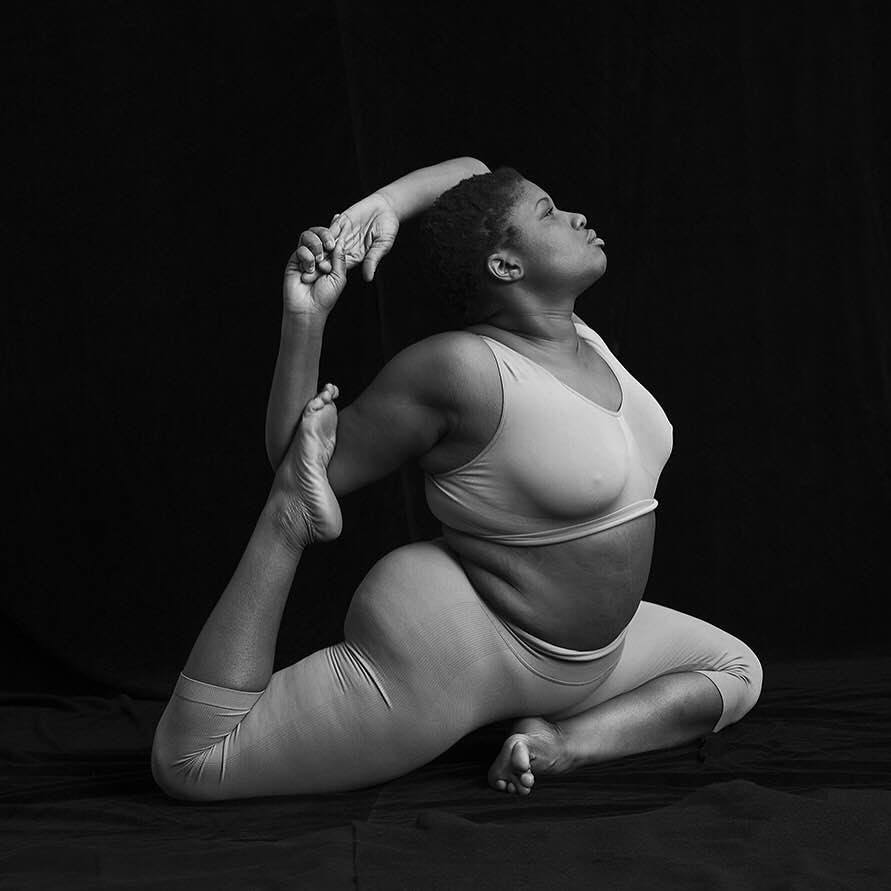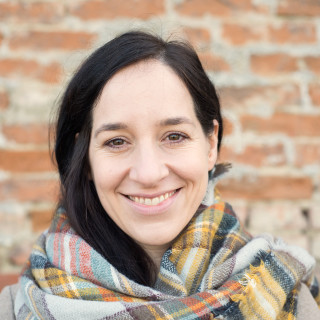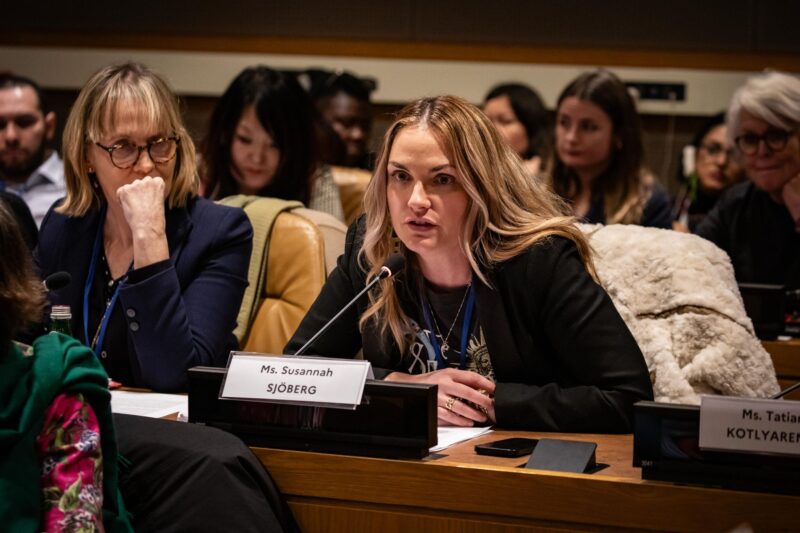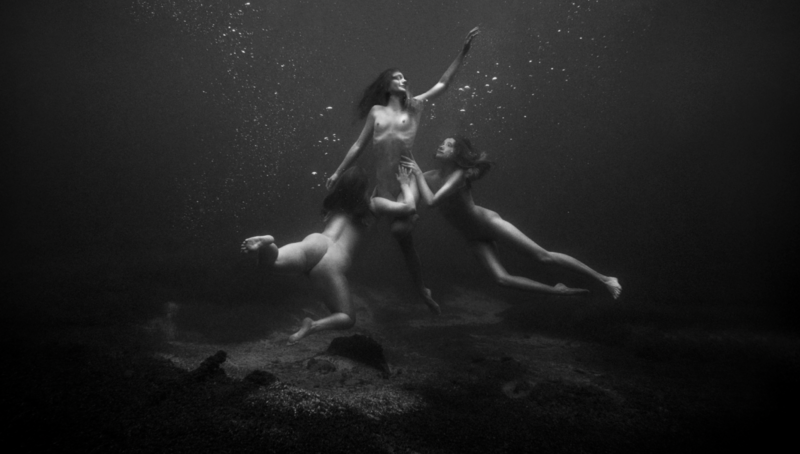The American yoga scene is dominated by white, athletic women. Jessamyn Stanley, the Afro-American yoga instructor who describes herself as ‘Fat Femme’, is breaking all the stereotypes. The Instagram star is part of the ‘Body-Positivity-Movement’ that has captured the United States.
By Veronika Eschbacher, Los Angeles
It is a lovely summer day in Santa Monica, California. Along the pier, a slew of tourists scream as they ride a rollercoaster and stuff themselves with caramel popcorn; a few streets down there is a quiet yoga studio. The air is filled with the smell of incense as yogis with bright-colored leggings and crop tops roll their yoga mats together. What all these yogis have in common is that they replicate the image of their yoga instructor: they are all young, white, long-haired, athletic women.
For the next two hours however, that will all be different. Jessamyn Stanley, the Afro-American yoga instructor from North Carolina, is bringing in her own studio and breaking all conventional yoga stereotypes. The room is well-lit with high ceilings and with Stanley at the front, a completely different audience makes themselves at home – four young, black, chubby women, a young man with pink hair in women’s clothes, two white people, a plump Asian woman over fifty, and a white man with a beer belly.
The 29-year-old Stanley remembers all too well what it is like to be the only fat person at a yoga course. A good five years ago, she came to a point in her life where she brought everything into question. She gave up on her art studies and worked at a taco bar all the while suffering from depression. One day, a friend was able to convince her to attend a yoga course. Stanley says today that a challenge had been missing in her life. Fat people were always told that there was only a certain kind of physical activity that they could do and that every sport she tried was tied to weight loss. On top of that, she had an innumerable amount of diets under her belt. “But with yoga, everything was different. It changed me, my attitude toward life and how I perceive the universe,” she says. “Yoga put me on my path.”
At the beginning of her yoga practice, she kept a record through pictures so that she could track her progress. She later shared the pictures on social media and blogged about her experiences. Now she has 327,000 followers just on Instagram. In her posts, Stanley promotes self-love and that fat people should not accept the boundaries that society lays out. “Middle fingers in the air, fat bodies out and proud – that is how I am living my life,” she writes. There are practically no hate comments to be found on her Facebook page, only thanks and admiration.
These days, Stanley flies across the United States offering some of the toughest yoga courses on the market. Companies producing yoga clothes and equipment are incessantly knocking on her door and her book “Every Body Yoga” was just recently released. “Deine Korrespondentin” met with her to discuss body-awareness, nude pictures, and fat shaming.
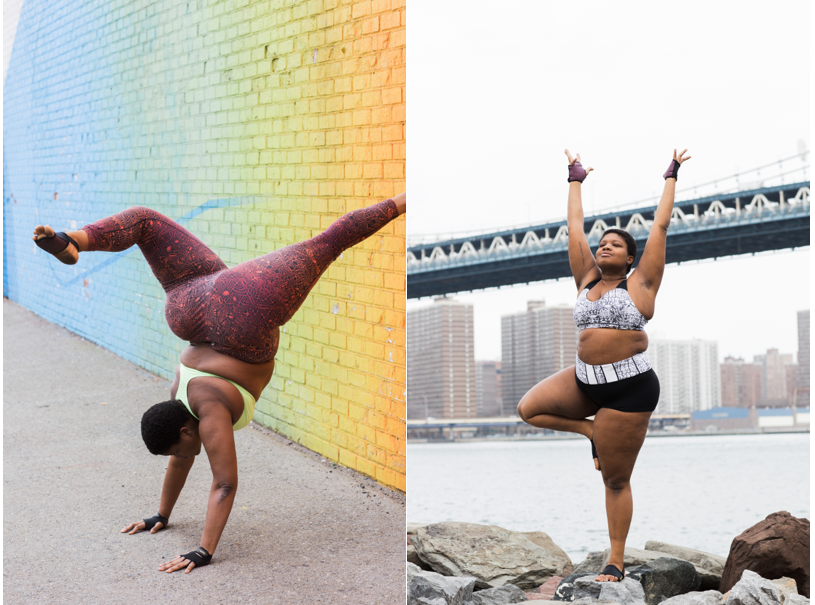
What experiences have you had with your body?
Jessamyn Stanley: I’m from North Carolina and grew up in a very traditional African American, former slave family. In the suburbs of North Carolina, things like segregation are still very real. I grew up in a community where there were mainly Afro-Americans. There, it wasn’t uncommon to have a larger body. For me, the first time my chubbiness became an issue was when I started high school. In general, my mom made me feel that my body was fine, but some things were really not OK. I was always supposed to wear something that made me look better and that concealed my belly. I believe it is tied to patriarchy – it’s expected of women to be appealing for men. Ultimately my mother was only trying to help me to be attractive in a way that society expected of me. Also, of course, in order to find someone who would marry me.
What kind of relationship do Americans have with their body?
Americans have effectively lost the ownership of their bodies. We are all taught that their bodies belong to the people around them and that they need to make their bodies attractive for these other people. It is very important that you look socially acceptable. That means that people align themselves according to how magazines or what is on television define as socially acceptable. Nowadays, all young women want to look like the Kardashians, before that Paris Hilton was the role model. There are also specific groups like all black women want to look like Beyoncé.
What kind of prejudices exist against fat people?
A lot. Fat is associated with being dumb, slow and unnecessary and that’s also why today there is a shying away from using the word ‘fat’. The entire health standard in the United States is based on the assumption that fat people die due to the consequences of their obesity. It is assumed that fat people purposefully determine the end of their life. That’s why it’s fine when someone is mean to you. They are helping you in finding the right way! Fat shaming is something that is completely normal in the United States. Practically no one questions it.
How do fat people see themselves?
Fat people are criticised a great deal and many of them find the correct response is to view themselves as the victim. In my opinion, that’s the wrong mindset. It would be correct to continue living on. That is not some kind of defiance, it’s simply this: it doesn’t matter to me what you think. I’m living my life. The inability to accept someone says a lot more about that person than it does about me. But a lot of fat people say: “Oh my god, you are so mean to me! I really do love myself and it’s because of you that I feel bad about myself. You should have compassion toward me.” But in this way, you don’t make people see you as an equal. That’s why they perceive you as a victim and bothersome, as a nuisance.
You post nude pictures of yourself and say that your “tits” repeatedly fall out of your clothes during yoga. For the United States that is pretty unusual, a place where women who nurse [publicly] get hit with a shitstorm.
The latter has to do with us living in a puritan society. You should look at my nude pictures in the context of third wave feminism. It is the realization that we as women have to de-sexualize our bodies. This is what is still standing in the way in reaching equality with men. How does one de-sexualize? By showing your body. Americans feel the most uncomfortable when they see breasts and vaginas. And heaven forbid they see the breasts or vagina of a large body woman. Then on top of that comes the bodies of black women that are strongly exoticized and were kidnapped by men, men that raped generations of colored women and violated their body.
That’s why it is so difficult for us to have ownership in this space. A key aspect from ownership is to show it, to glorify it and to use it as your power. That is what Nicki Minaj does, that’s what Beyoncé does. Everyone is distracted by the glitter that surrounds both these singers, but eventually, that is what they do. They take back the power of colored women’s bodies. We have been demoralized and discouraged over the past five hundred years. This development is actually huge in America and is really underestimated because in our media, strong white voices and topics dominate.
Where is the line between “cheap” sexual poses and reclaiming one’s own body?
There isn’t one. A line like that comes from people that believe you need to draw a line between high-brow and low-brow. But it’s all the same. At the end of the day, people consider the leotard from Beyoncé good because she is socially accepted. If Beyoncé would only be on black entertainment television or would only be supported by a small group, people would say: that is trashy. Besides, there are enough people that don’t understand Beyoncé’s mission.
Don’t naked bodies encourage more sexualisation?
The problem with de-sexualization is that still today, everything that is hypersexualized comes from men. There are these major efforts of de-sexualization and the men spoil everything by saying: “Oh, I love that! That is great. You are doing exactly that what I want.” But it isn’t for them! It isn’t for them but they believe that it is. But yeah, there is this catch that on the one hand, there is the intention to reclaim one’s ownership, on the other hand this is a way to make it clear that this is not something for someone else to sell. We as women should not condemn each other in our efforts here.
How important are the words that we use? In English, there are a ton of variations in describing fat people. You yourself use ‘fat’, but there is also ‘curvy, body-positive, plus-size, larger body’.
The words that we use are extremely important. They all have a different meaning. For me, the word ‘fat’ is the opposite of ‘thin’. In our society, ‘fat’ has gained so many additional meanings like I mentioned – dumb, lazy, etc. In order to reverse it back to its original meaning, we can’t simply avoid it. We need use it and we need to stop using it as a weapon. ‘Body-positivity’ doesn’t have to do with being fat. That has more to do with a broader concept that you and your body are perfect every day. When you put all these concepts in motion and spread them out – including ‘fat-positivity’ – that can really lead to a dynamic where a lot of people who feel uncomfortable in their bodies and feel under pressure by the expectations from others, can begin to feel equal. Then the feeling that there is a fight between fat and non-fat will go away.
Originally posted by Deine Korrespondentin
Translated by Catherine Barney
Facebook-Profil of Jessamyn Stanley
Instagram Account: @mynameisjessamyn
Snapchat Account: mynameisjessamy
Critical article about the topic Body Positivity (In German)
Act one of This American Life episode “Tell me I’m Fat”
Essay from Lindy West: Hello, I am fat

